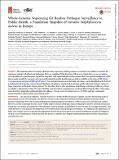Whole-genome sequencing for routine pathogen surveillance in public health : a population snapshot of invasive Staphylococcus aureus in Europe
Abstract
The implementation of routine whole-genome sequencing (WGS) promises to transform our ability to monitor the emergence and spread of bacterial pathogens. Here we combined WGS data from 308 invasive Staphylococcus aureus isolates corresponding to a pan-European population snapshot, with epidemiological and resistance data. Geospatial visualization of the data is made possible by a generic software tool designed for public health purposes that is available at the project URL (http://www.microreact.org/project/EkUvg9uY?tt=rc). Our analysis demonstrates that high-risk clones can be identified on the basis of population level properties such as clonal relatedness, abundance, and spatial structuring and by inferring virulence and resistance properties on the basis of gene content. We also show that in silico predictions of antibiotic resistance profiles are at least as reliable as phenotypic testing. We argue that this work provides a comprehensive road map illustrating the three vital components for future molecular epidemiological surveillance: (i) large-scale structured surveys, (ii) WGS, and (iii) community-oriented database infrastructure and analysis tools. IMPORTANCE: The spread of antibiotic-resistant bacteria is a public health emergency of global concern, threatening medical intervention at every level of health care delivery. Several recent studies have demonstrated the promise of routine whole-genome sequencing (WGS) of bacterial pathogens for epidemiological surveillance, outbreak detection, and infection control. However, as this technology becomes more widely adopted, the key challenges of generating representative national and international data sets and the development of bioinformatic tools to manage and interpret the data become increasingly pertinent. This study provides a road map for the integration of WGS data into routine pathogen surveillance. We emphasize the importance of large-scale routine surveys to provide the population context for more targeted or localized investigation and the development of open-access bioinformatic tools to provide the means to combine and compare independently generated data with publicly available data sets.
Citation
Aanensen , D M , Feil , E J , Holden , M T G , Dordel , J , Yeats , C A , Fedosejev , A , Goater , R , Castillo-Ramírez , S , Corander , J , Colijn , C , Chlebowicz , M A , Schouls , L , Heck , M , Pluister , G , Ruimy , R , Kahlmeter , G , Åhman , J , Matuschek , E , Friedrich , A W , Parkhill , J , Bentley , S D , Spratt , B G , Grundmann , H , ESCMID study group on Molecular Epidemiological Markers (ESGEM) & European Staphylococcal Reference Laboratory Working Group 2016 , ' Whole-genome sequencing for routine pathogen surveillance in public health : a population snapshot of invasive Staphylococcus aureus in Europe ' , mBio , vol. 7 , no. 3 , e00444-16 , pp. 1-15 . https://doi.org/10.1128/mBio.00444-16
Publication
mBio
Status
Peer reviewed
ISSN
2150-7511Type
Journal article
Description
This work, including the efforts of Matthew Holden, Janina Dordel, Julian Parkhill, and Stephen Bentley, was funded by Wellcome Trust (098051). This work, including the efforts of David M. Aanensen, Corin Yeats, and Artemij Fedosejev, was funded by Wellcome Trust (099202). This work, including the efforts of Brian Spratt, was funded by Wellcome Trust (089472). This work, including the efforts of Santiago Castillo-Ramírez, was funded by Medical Research Council (MRC) (G1000803).Collections
Items in the St Andrews Research Repository are protected by copyright, with all rights reserved, unless otherwise indicated.

